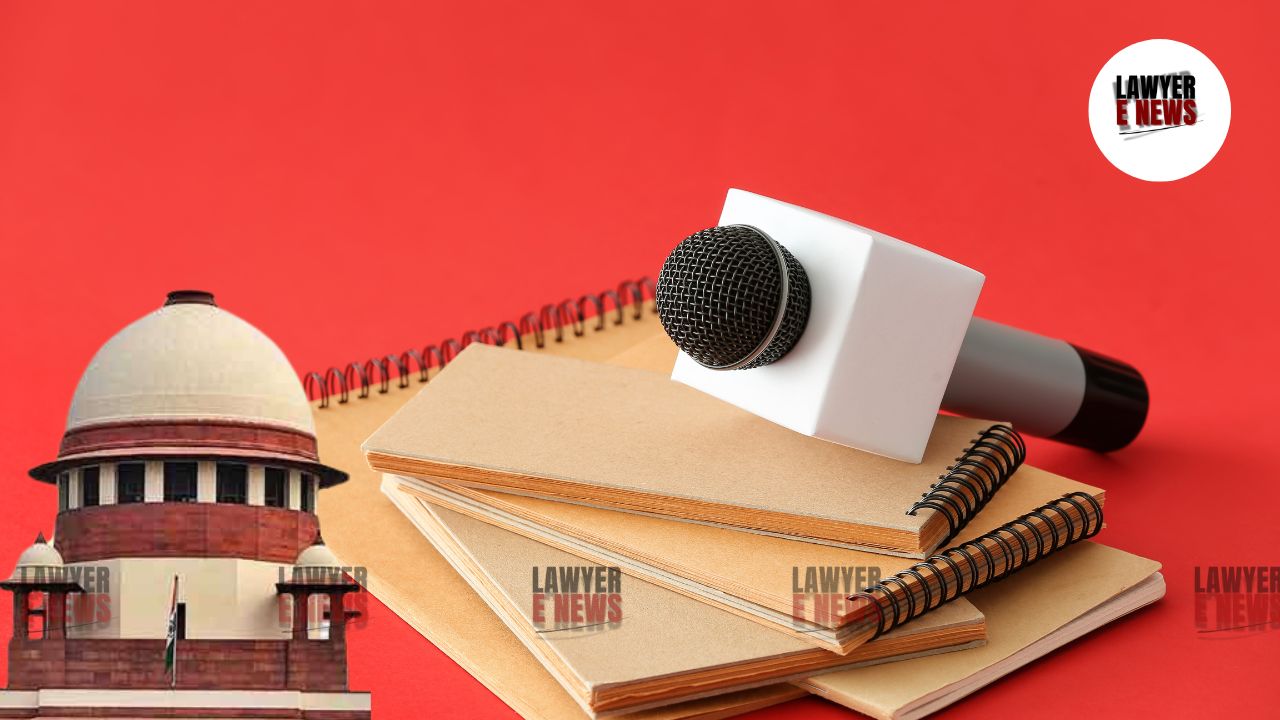-
by Admin
15 February 2026 5:35 AM



"No Coercive Steps Against the Petitioner in Connection With the Subject Articles" – Supreme Court Provides Relief to Journalist Mamta Tripathi
Today on October 24, 2024, the Supreme Court of India granted interim protection to journalist Mamta Tripathi, who is facing multiple FIRs for her articles alleging caste discrimination within the Uttar Pradesh administration. The Court directed that no coercive action should be taken against Tripathi while the case is under review and issued a notice to the Uttar Pradesh government seeking its response.
A bench comprising Justices B.R. Gavai, Prashant Kumar Mishra, and K.V. Viswanathan passed the order in response to a petition filed by Tripathi, who has been named in four FIRs related to her journalistic work. The Court granted Tripathi temporary protection from arrest and other punitive measures while her plea to quash the criminal proceedings is considered.
"Issue Notice, Returnable in 4 Weeks": Supreme Court Grants Interim Relief
While dictating the order, Justice Gavai remarked, "Issue notice, returnable in 4 weeks... in the meantime, it is directed that no coercive steps be taken against the petitioner in connection with the subject articles." The Court’s decision provides temporary relief to Tripathi, allowing her to continue her legal challenge without the immediate threat of arrest or further action by the state.
Mamta Tripathi, a journalist, is facing legal action for a series of articles that explore caste-related issues in the Uttar Pradesh administration. The FIRs lodged against her accuse her of defaming the state government by highlighting incidents of caste-based discrimination. Tripathi's petition challenges the validity of these criminal proceedings, arguing that they infringe upon her fundamental rights under Article 19(1)(a) of the Constitution, which guarantees freedom of speech and expression.
Prior Precedent: Interim Protection to Abhishek Upadhyay for Similar Reporting
The Supreme Court’s decision to grant relief to Tripathi follows a similar case involving journalist Abhishek Upadhyay, who also faced legal action for his reporting on caste dynamics within the Uttar Pradesh government. Earlier this month, the Supreme Court had granted interim protection to Upadhyay, emphasizing that journalists should not face criminal proceedings solely because their work is critical of the government.
In its order protecting Upadhyay, a bench of Justices Hrishikesh Roy and SVN Bhatti observed, "In democratic nations, freedom to express one's views are respected. The rights of the journalists are protected under Article 19(1)(a) of the Constitution of India. Merely because writings of a journalist are perceived as criticism of the Government, criminal cases should not be slapped against the writer."
Petitioner’s Arguments: FIRs a Form of Harassment
Senior Advocate Siddharth Dave, representing Mamta Tripathi, argued that the multiple FIRs registered against her amount to harassment, stating that journalists like Tripathi and Upadhyay are being targeted for raising sensitive issues, including caste conflicts between Thakurs and Brahmins, and for highlighting instances such as District Magistrates misusing red lights on their vehicles.
Dave also pointed out that similar to Upadhyay's case, Tripathi directly approached the Supreme Court, claiming a violation of her fundamental rights. The Court had previously stayed one FIR against Tripathi in response to an earlier petition. Dave contended that the barrage of FIRs was aimed at silencing Tripathi's journalistic efforts, a tactic frequently used against reporters addressing sensitive issues in Uttar Pradesh.
Supreme Court Issues Notice to Uttar Pradesh Government
The Supreme Court bench, after considering the arguments, issued a notice to the Uttar Pradesh government and directed it to submit its response within four weeks. The Court’s interim order ensures that Tripathi is protected from coercive actions in connection with six articles she wrote, while her petition for quashing the FIRs is examined.
Interim Relief for Journalists Facing Legal Challenges
The Supreme Court’s intervention in Mamta Tripathi's case underscores its commitment to protecting the rights of journalists, particularly when they are targeted for critiquing government actions. The Court’s order aligns with its earlier stance that criminal proceedings should not be weaponized against journalists for exercising their right to free speech.
As the case unfolds, the outcome will likely have significant implications for press freedom, particularly in relation to journalists reporting on caste-based issues and governance in India.
Date of Decision: October 24, 2024
Mamta Tripathi v. The State of Uttar Pradesh
